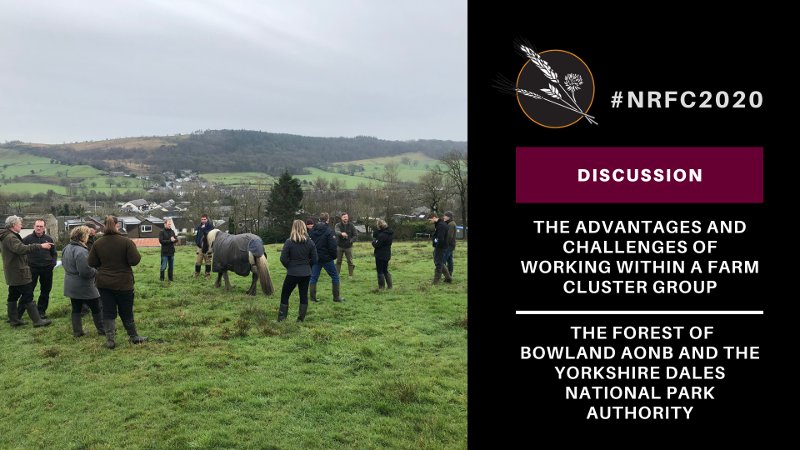There is a view that facilitated cluster groups can be a very effective way of building good relationships with farmers, providing interesting and relevant training and encouraging landscape scale action and delivery. There have been many case studies from the South of England, but much less discussion of the particular issues for groups in the uplands – in terms of how groups operate, how they can be funded and how delivery (in addition to training sessions) can be achieved.
Topics covered:
- Best bits and challenges of group work
- Outcomes which can be achieved through group working
- Advantages of membership of a cluster group
- Ways forward including funding farmer cluster group working
This session started with an overview of the Countryside Stewardship Facilitation Fund followed by presentations that provided a summary of 3 Facilitation Fund groups based in Northern England; Pendle Hill Farmers Network, Lunesdale Farmers Group and Wensleydale Farmers Group.
The group members met for a combination of indoor and outdoor events guided by a steering group made up of the facilitator, key partners and farmer members. On average 8 group events are held per year on topics including:
- Soil health & management on-farm events
- Countryside Stewardship (CS) workshops
- NFM measures farm walks- leaky dams, hedgerows, ponds, low earth bunds, woodlands
- Wensleydale ‘Payment by Results’ and National Trust ‘Payment for Outcomes’ farm walks
- Managing rush encroachment and land for breeding waders
- Integrated parasite management
- Farm Carbon Toolkit
This was followed by contributions from 3 of the farmers involved (Alastair Dinsdale, Thomas Binns and Carol Moffatt) sharing their honest views on what worked well and some of the challenges encountered. There followed a general open discussion by all attending, which plenty of questions and comments on Chat.
What did we learn?
Strengths and opportunities
- Group working with neighbours/peers
- Social aspect to meetings
- Good range of events
- Joint delivery with other cluster/facilitation fund groups in the wider area
- 20% uplift for Countryside Stewardship applications
- Influencing schemes such as Environmental Land Management Scheme (ELMs) being developed by DEFRA
- Support available through existing/new partnerships
Weaknesses and threats largely linked to limitations and rules of the Facilitation Fund scheme including
- Time consuming administration
- agreeing changes to the programme was difficult- the members needed time to digest how the group could work and what they could achieve
- Lack of delivery opportunities within budget
- Unable to provide follow up 1: 1 support
- Lack of recognition that farming practices and thus time availability from the members across country varies throughout the year
- Focus on NFM
- Due to limitations in how the fund could be spent, the budgets were well underspent
Independent/3rd party facilitator is key:
- Neutral who isn’t involved with local politics/issues or sensitive agendas (free of baggage)
- Has the trust/respect of the farmers/land managers or can build this up (trusted member of the local community)
- Able to share/convey as much relevant information in the right way
Recognition that it can take a while to build up trust and enable effective group working
How to get bums on seats?
- Involve key locally respected farmers/landowners
- Encourage farmers to encourage their neighbours/friends
- Include a social element to the meetings/events e.g. breakfast meetings/tea & cake/supper. Include family friendly activities e.g. moth traps
- Bring in speaker who grabs their interest.
- Location of events- community venues, pubs, farm based (farmers love to wander around another farm!)
- Consider time limitations, days of week and time of year- one size doesn’t fit al
Going forward what are the benefits of setting up a farm cluster group?
- Peer to peer influencing and learning
- Independent trusted/respected facilitator
- Can include a social element to the events/meetings
- Reduced costs such as for consultants and training
- Potential delivery of environmental enhancements across several adjacent holdings
- Members encouraging their neighbours/friends
- Added incentives for those working and delivering in clusters- this is likely to be key for Tiers 2 and 3 within ELMs
Further information
There are some useful resources available on the below website for those considering forming a farm cluster including more case studies from across the UK, monitoring wildlife, potential funding sources and how to engage with local communities. https://www.farmerclusters.com/
Pendle Hill Farmers network: Sarah Robinson sarah.robinson@forestofbowland.com
Lunesdale Farmers Group: Hannah Fawcett Hannah.fawcett@yorkshiredales.org.uk
Wensleydale Farmers Group: Tarja Wilson tarja.wilson@yorkshiredales.org.uk
You can watch the recording of the session here.

